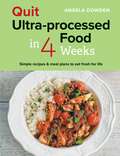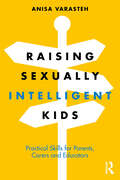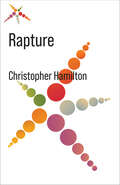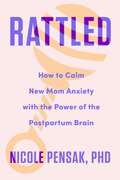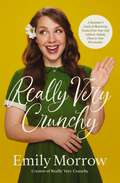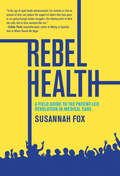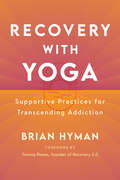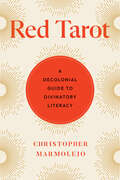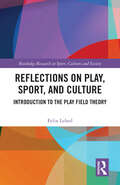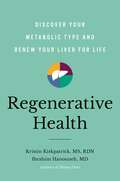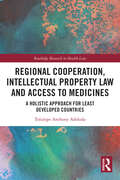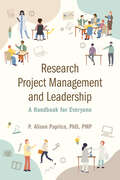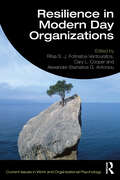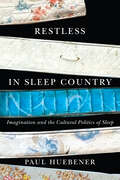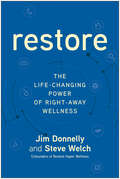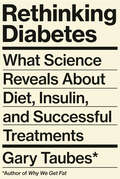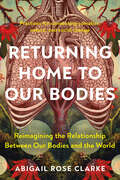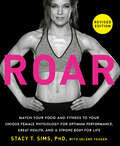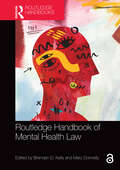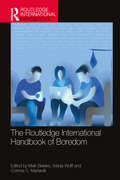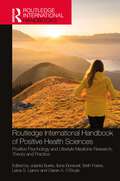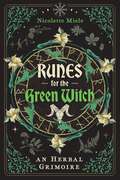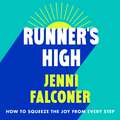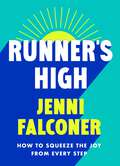- Table View
- List View
Quit Ultra-processed Food in 4 Weeks: Simple recipes & meal plans to eat fresh for life
by Angela DowdenBreak free from ultra-processed foods with this practical guide Have you ever wondered why you can't stop reaching for chocolates, ice cream, fizzy drinks, and snacks? All of these familiar suspects are ultra-processed foods: they're filled with additives and preservatives to keep you coming back for more. So how do you avoid ultra-processed foods when they're everywhere around you? This book will help you through every step of the way: you'll learn to check food label checklists and stock up your cupboard with healthy foods. With over 100 recipes for every meal, plus four weekly meal plans and shopping lists, you can easily eat unprocessed food on the go.CONTENTS INCLUDE:BreakfastsMaple-glazed granola with fruit; Wholemeal cheese & bacon muffins; Moroccan-inspired baked eggsLunchesButter bean, tomato & feta salad; Vietnamese-style noodle salad; Roasted chickpeas with spinachDinnersChargrilled halloumi with olives; Frying pan macaroni cheese; Mediterranean roast lambDessertsHoney ricotta fritters with pistachios; Blackberry & apple crumbles; Chocolate puddle puddingBakingPeach & brown sugar muffins; Mixed-seed soda bread; Chocolate flapjacksSnacks & DrinksPopcorn with chilli oil; Fresh lemonade; Orange & passionfruit sparkler
Quit Ultra-processed Food in 4 Weeks: Simple recipes & meal plans to eat fresh for life
by Angela DowdenBreak free from ultra-processed foods with this practical guide Have you ever wondered why you can't stop reaching for chocolates, ice cream, fizzy drinks, and snacks? All of these familiar suspects are ultra-processed foods: they're filled with additives and preservatives to keep you coming back for more. So how do you avoid ultra-processed foods when they're everywhere around you? This book will help you through every step of the way: you'll learn to check food label checklists and stock up your cupboard with healthy foods. With over 100 recipes for every meal, plus four weekly meal plans and shopping lists, you can easily eat unprocessed food on the go.CONTENTS INCLUDE:BreakfastsMaple-glazed granola with fruit; Wholemeal cheese & bacon muffins; Moroccan-inspired baked eggsLunchesButter bean, tomato & feta salad; Vietnamese-style noodle salad; Roasted chickpeas with spinachDinnersChargrilled halloumi with olives; Frying pan macaroni cheese; Mediterranean roast lambDessertsHoney ricotta fritters with pistachios; Blackberry & apple crumbles; Chocolate puddle puddingBakingPeach & brown sugar muffins; Mixed-seed soda bread; Chocolate flapjacksSnacks & DrinksPopcorn with chilli oil; Fresh lemonade; Orange & passionfruit sparkler
Raising Sexually Intelligent Kids: Practical Skills for Parents, Carers and Educators
by Anisa VarastehMany parents feel uncomfortable with the thought of having ‘the talk’ with their children, especially teenagers. But what many people don’t realise is how much of sexuality education has nothing to do with sex itself. In this book, Clinical Sexologist Anisa Varasteh teaches the foundations of a comprehensive sexuality education for children and teenagers and answers the most common questions young people have about sex and sexuality. Contrary to popular belief, talking about sex and sexuality does not make young people more prone to sexual experimentation. This book provides research-based evidence for how a comprehensive sexuality education is important for children’s safety, psychological and physical wellbeing. It identifies the barriers to having open conversations with children and teenagers, and outlines methods for how to overcome them. With a focus on skills, the book addresses the building blocks of sexuality education and how to develop an environment of mutual trust, it outlines key topics for discussion and the skills that children need to develop to make healthy decisions about their sexuality. Complete with practical support, including over 20 worksheets and a comprehensive list of tough questions from teenagers – and suggestions for how to address them – this book is an essential resource for parents, carers and educators who are responsible for the health, safety and development of children and teenagers.
Rapture (No Limits)
by Christopher HamiltonWhat is it like to experience rapture? For philosopher Christopher Hamilton, it is a loss of self that is also a return to self—an overflowing and emptying out of the self that also nourishes and fills the self. In this inviting book, he reflects on the nature of rapture and its crucial yet unacknowledged place in our lives.Hamilton explores moments of rapture in everyday existence and aesthetic experience, tracing its disruptive power and illuminating its philosophical significance. Rapture is found in sexual love and other forms of intense physical experience, such as Philippe Petit’s nerve-defying wire walk between the Twin Towers. Hamilton also locates it in quieter but equally joyous moments, such as contemplating a work of art or the natural world. He considers a range of examples in philosophy and culture—Nietzsche and Weil, Woolf and Chekhov, the extremes of experience in Werner Herzog’s films—as well as aspects of ordinary life, from illness to gardening. Conversational and evocative, this book calls on us to ask how we might make ourselves more open to experiences of rapturous joy and freedom.
Rattled: How to Calm New Mom Anxiety with the Power of the Postpartum Brain
by Nicole Pensakmatrescence noun /mæ'tres.?nts/ the process of becoming a mother: The physical, psychological, and emotional changes you go through after the birth of your child . . . largely unexplored in the medical community. —Cambridge Dictionary Most new mothers bring their infants to the doctor but ignore any distressing feelings or sensations they might themselves have—that sense of being “rattled” at many moments throughout the day and night. In Rattled, Dr. Nicole Pensak shares her own experiences and those of her patients to help new mothers feel informed, validated, and guided through matrescence. After giving birth, a woman often feels like a completely different person. It may sound dramatic, but the rollercoaster of physical and psychological changes affects brain and body in a similar way that adolescence changes us. To compound that, many women hide these feelings, worrying that something is wrong with them. Dr. Nicole Pensak is here to reassure us that being “rattled” is normal, and not at all surprising. After all, seismic changes in identity and emotion have occurred. Research shows that a woman’s brain shifts in real, biological ways very quickly after giving birth. Many women become hypervigilant, for good reason: the brain is telling her to stay alert because she has a human to keep alive and safe. While these brainpower boosts can cause anxious feelings, they can also help to manage the distress and harness the advantages of the postpartum brain. In fact, this is a time of neuroplasticity, when the brain is more receptive to positive reinforcement. Trained at Yale and Harvard and certified in perinatal mental health, Dr. Pensak provides practical and emotional support, helping to relieve the anxiety and pressure for perfection in motherhood and paving the way for a better beginning for families and babies. She discusses mental health treatment and the upside of therapy during this changing time, and offers accessible scientific information, relatable anecdotes, and strategies for self-care. The result is a reassuring and practical handbook that new mothers and their families will refer to time and again.
Really Very Crunchy: A Beginner's Guide to Removing Toxins from Your Life without Adding Them to Your Personality
by Emily MorrowFind your Inner Crunchy without becoming that person with this helpful guide from social media star Really Very Crunchy. Are you tired of being bombarded by toxins at every turn? Do you want a more natural, "crunchy" approach to the world (with or without the beige aesthetic)? Well, grab your kombucha and join Emily Morrow on a journey to a more wholesome existence with Really Very Crunchy: A Beginner's Guide to Removing Toxins from Your Life without Adding Them to Your Personality.Emily Morrow, creator of the viral "Really Very Crunchy" social media accounts, guides you through the ins and outs of starting and maintaining a crunchy lifestyle. With her signature humor and a delightfully sincere approach, she will show you how crunchy is a spectrum and how every little choice you make is one small step away from crunch-ifying your own life. From the basics of crunchy to the more advanced choices (beets instead of blush, anyone?), you will quickly say goodbye to toxic chemicals and hello to a healthier, happier way of living. Funny, accessible, and encouraging--never judgmental or fear-based--Emily will help you: Learn how to make simple, mindful steps toward natural livingImplement healthy, life-giving activities into your family's routineNavigate the challenges of adopting the crunchy way of life with sensible, easy-to-implement ideasDevelop a new mindset when it comes to shopping for clothes, food, and cleaning productsDiscover natural remedies for just about everything So what are you waiting for? Embrace your inner crunchy (or silky, if that's where you're starting) and dip your toes into a healthier, more sustainable life. Who knows? You may find out you're Really Very Crunchy after all.
Rebel Health: A Field Guide to the Patient-Led Revolution in Medical Care
by Susannah FoxAn action-oriented and radically hopeful field guide to the underground, patient-led revolution for better health and health care.Anyone who has fallen off the conveyer belt of mainstream health care and into the shadowy corners of illness knows what a dark place it is to land. Where is the infrastructure, the information, the guidance? What should you do next? In Rebel Health, Susannah Fox draws on twenty years of tracking the expert networks of patients, survivors, and caregivers who have come of age between the cracks of the health care system to offer a way forward. Covering everything from diabetes to ALS to Moebius Syndrome to chronic disease management, Fox taps into the wisdom of these individuals, learns their ways, and fuels the rebel alliance that is building up our collective capacity for better health.Rebel Health shows how the next wave of health innovation will come from the front lines of this patient-led revolution. Fox identifies and describes four archetypes of this revolution: seekers, networkers, solvers, and champions. Each chapter includes tips, such as picking a proxy to help you navigate the relevant online communities, or learning how to pitch new ideas to investors and partners or new treatments to the FDA. On a personal level, anyone who wants to navigate the health care maze faster will want to become a health rebel or recruit some to their team. On a systemic level, it is a competitive advantage for businesses, governments, and organizations to understand and leverage the power of connection among patients, survivors, and caregivers.Proactive, optimistic, and innovative, Rebel Health is a guiding light for anyone who wishes to join the health rebel alliance and become the hero of their own story.
Recovery with Yoga: Supportive Practices for Transcending Addiction
by Brian HymanDrawn from yoga philosophy and mindfulness, this collection of 30 potent, supportive tools will bolster, inspire, and assist those in addiction recovery. This collection of 30 yoga and mindfulness tools will help support those in recovery from addiction of all kinds. Thirty accessible, pointed teachings offer inspiration, comfort, and solidarity in the moment, helping us cultivate a powerful and purposeful life in recovery and to create a new design for living. Each chapter focuses on a quality—such as vigilance, acceptance, accountability, among others—and delves into how to manifest it in your recovery journey. Brian Hyman, a yoga teacher and recovery activist, understands deeply what people need to maintain sobriety and strengthen recovery—and knows that those who struggle with addiction also often need support with other mental health challenges, like obsession, anxiety, depression. The practices—which include inquiry questions, meditations, awareness exercises, breathing practices, yoga nidra, among others—will quiet the mind in difficult moments, support us as we establish meaningful relationships, and reinforce the power that recovery offers us. He offers resources and additional reading suggestions in the back matter. Hyman uses yogic philosophy, mindfulness teachings, personal anecdotes, and secular wisdom to illuminate each quality and the role it plays in helping us create the life we want.
Red Tarot: A Decolonial Guide to Divinatory Literacy
by Christopher MarmolejoDesigned to be used with any deck, Red Tarot is a radical praxis and decolonized oracle that moves beyond self-help and divination to reclaim tarot for liberation, self-determination, and collective healing. For readers of Postcolonial Astrology and Tarot for ChangeRed Tarot speaks to anyone othered for their identity or ways of being or thinking—LGBTQIA2S+ and BIPOC folks in particular—presenting the tarot as a radical epistemology that shifts the authority of knowing into the hands of the people themselves.Author Christopher Marmolejo frames literacy as key to liberation, and explores an understanding of tarot as critical literacy. They show how the cards can be read to subvert the dynamics of white supremacist-capitalist-imperialist-patriarchy, weaving historical context and spiritual practice into a comprehensive overview of tarot.Situating tarot imagery within cosmologies outside the Hellenistic frame—Death as interpreted through the lens of Hindu goddess Chhinnamasta, the High Priestess through Aztec goddess Coyolxauhqui—Marmolejo&’s Red Tarot is a profound act of native reclamation and liberation. Each card&’s interpretation is further bolstered by the teachings of Toni Morrison, bell hooks, Paulo Freire, José Esteban Muñoz, and others, in an offering that integrates intersectional wisdom with the author&’s divination practice—and reveals tarot as an essential language for liberation.
Reflections on Play, Sport, and Culture: Introduction to the Play Field Theory (Routledge Research in Sport, Culture and Society #141)
by Felix LebedThe psychological dependence of humanity on playing is huge. Its nature and functional utility are unclear. These linked yet contradictory issues have created the intrigue that has fed philosophical thought for more than two hundred years. During this period, philosophy transferred many of the subjects of its analysis to the aegis of the humanities that it spawned. Each of them pays close attention to human play and studies it with its own methods of theoretical and experimental research. Thus, what was once a general philosophical comprehension of human play has branched out into different directions, definitions, and theories. This new book represents a renewed general view of human play. The unique quality of the volume lies in its fairly rare interdisciplinary methodology, encompassing a broad spectrum of the humanities: philosophy, anthropology, sociology, and the history of play, and behavioral analysis of playing, which have been done by the author. As a result, the volume ends with the proposition of a new general approach to human play that is named by the author “play field theory”. Such an approach makes reflections on play, sport, and culture a source for all scholars studying play, by widening their knowledge through both a new general view and their familiarization with notions from neighboring fields and disciplines.
Regenerative Health: Discover Your Metabolic Type and Renew Your Liver for Life
by Kristin Kirkpatrick Ibrahim HanounehThe authors of Skinny Liver offer a new look at liver disease through four types of conditions and deliver practical plans for liver health. Your liver plays a key role in your health, affecting chronic inflammation, heart health, mental health, cognitive health, and metabolic health (including type 2 diabetes). Yet most people aren&’t aware of its power—and are unknowingly sabotaging their liver health. Medical understanding has evolved to reveal that metabolic health is the best indicator of fatty liver risk, meaning that treating fatty liver disease is less about losing weight (and the unhealthy diet culture that accompanies it) and more about adopting smart lifestyle habits to reduce your risk. Based on the most up-to-date research, Regenerative Health introduces the four metabolic profiles—the Preventer, the Fine-Tuner, the Re-calibrator, and the Regenerator–and an easy assessment. Once you determine your type, you&’ll follow easy steps to customize your Regenerative Health eating and lifestyle plan. With practical tips on nutrition, exercise, and wellness; meal suggestions; recipes; and recommended snacks, Regenerative Health will help you treat your current liver issues and also help you prevent more from developing. Whether you already have a diagnosis or simply want to be feel as good as you can, experts Kristin Kirkpatrick and Ibrahim Hanouneh give you the knowledge and the tools to take charge of your health.
Regional Cooperation, Intellectual Property Law and Access to Medicines: A Holistic Approach for Least Developed Countries (Routledge Research in Health Law)
by Tolulope Anthony AdekolaThis book examines the potential for regionalization of intellectual property law and policy as a means of improving pharmaceutical access for least developed countries. The challenge of sustainable access to pharmaceuticals continues to be an issue of global significance. While much has been written on emerging economies in this context, least developed countries have been largely overlooked. This book fills this gap by taking the East African Community as a case study of developing and least developed countries to illustrate why and how a regional collective approach is preferred. It adopts a holistic approach in finding sustainable solutions to both IP and non-IP barriers to pharmaceutical access across a range of inter-related issues through a regional cooperative scheme. It evaluates factors that are necessary for successful regional cooperation, such as legal and policy coherence, WTO rule compliance, the threat of protectionism, regional competition rules, and so on, in order to produce relevant legal and policy recommendations to both existing and intending regional coalitions desiring to improve pharmaceutical access. It also looks beyond the scope of IP barriers to pharmaceutical access, examining non-IP-related factors such as pharmaceutical market intelligence, local pharmaceutical manufacturing capacity, economies of scale and purchasing power, medical regulation and quality assurance, technology transfer, and market size amongst others. The book will be an invaluable resource for academics, researchers and policy-makers working in the areas of Public Health Law, International Trade Law, Intellectual Property Law and Development Studies.
Research Project Management and Leadership: A Handbook for Everyone
by P. Alison PapricaThe project management approaches, which are used by millions of people internationally, are often too detailed or constraining to be applied to research. In this handbook, project management expert P. Alison Paprica presents guidance specifically developed to help with the planning, management, and leadership of research. Research Project Management and Leadership provides simplified versions of globally utilized project management tools, such as the work breakdown structure to visualize scope, and offers guidance on processes, including a five-step process to identify and respond to risks. The complementary leadership guidance in the handbook is presented in the form of interview write-ups with 19 Canadian and international research leaders, each of whom describes a situation where leadership skills were important, how they responded, and what they learned. The accessible language and practical guidance in the handbook make it a valuable resource for everyone from principal investigators leading multimillion-dollar projects to graduate students planning their thesis research. The book aims to help readers understand which management and leadership tools, processes, and practices are helpful in different circumstances, and how to implement them in research settings.
Resilience in Modern Day Organizations (Current Issues In Work And Organizational Psychology Ser.)
by Fotinatos-Ventouratos, Ritsa S. J. Cary L. Cooper Antoniou, Alexander-Stamatios G.This international and thought-provoking volume addresses both theoretical and conceptual issues of resilience in modern organizations, looking at areas of concern and providing suggestions for future preventative measures. In recent years, organizations across the world have been subjected to major upheavals as several crises, including the COVID-19 pandemic, the World Economic Crisis, and the Migratory Crisis, have contributed to the changing landscape of work. Individuals, organizations, and societies have been forced to re-think, re-adjust, and re-align in the face of adversity. The “survivors” of such upheavals are those who come to grips with the new realities of our times and encompass resilience in its entirety. This timely collection assesses resilience on critically important variables, such as socio-economic status, occupational type, and gender differences, and highlights preventative measures that organizations and individuals should take to maximise wellbeing and adjustment in these everchanging and challenging times. Essential reading for students, scholars, practitioners, and policy makers, this volume sheds light on the multi-faceted ways to enhance the resilience paradigm and offers insights into implications for future research in the area.
Restless in Sleep Country: Imagination and the Cultural Politics of Sleep
by Paul HuebenerSleep, and the lack of it, is a public obsession and an enormous everyday quandary. Troubled sleep tends to be seen as an individual problem and personal responsibility, to be fixed by better habits and tracking gadgets, but the reality is more complicated. Sleep is a site of politics, culture, and power.In Restless in Sleep Country Paul Huebener pulls back the covers on cultural representations of sleep to show how they are entangled with issues of colonialism, homelessness, consumer culture, technology and privacy, the exploitation of labour, and the effects of the Covid-19 pandemic. Even though it almost entirely evades direct experience, sleep is the subject of a variety of potent narratives, each of which can serve to clarify and shape its role in our lives. In Canada, cultural visions of slumber circulate through such diverse forms as mattress commercials, billboards, comic books, memoirs, experimental poetry, and bedtime story phone apps. By guiding us through this imaginative landscape, Huebener shows us how to develop a critical literacy of sleep.Lying down and closing our eyes is an act that carries surprisingly high stakes, going beyond individual sleep troubles. Restless in Sleep Country illuminates the idea of sleep as a crucial site of inequity, struggle, and gratification.
Restore: The Life-Changing Power of Right-Away Wellness
by Jim Donnelly Steve WelchDiscover how cutting-edge treatments are helping people of all ages reverse common health issues and live longer, healthier, pain-free lives—and how you can start your new life today.Pain, disease, and complications of aging are universal problems, but &“right-away&” wellness is far more accessible than most people realize. Restore is a preventative approach to wellness based on a simple principle: therapies that make you feel better in the short term lead to consistent, long-term improvement. You don&’t need a cryo chamber to reap the benefits of cryotherapy. This book will teach you how to get the most from these techniques, whether or not you have access to specialized treatments. With clear, supporting science, Restore Hyper Wellness cofounders Jim Donnelly and Steve Welch share the real-life success stories behind paradigm-changing technologies—and how to use the power of those technologies in your everyday life for an immediate, palpable boost.This much-needed guide will change the way you think about your health, arming you with insider knowledge such as:The science and history of cryotherapy, red light therapy, nutrient-infused IV drips, and infrared saunasHow restorative practices are used to relieve and even reverse major health issues, including chronic pain, arthritis, cancer, Alzheimer&’s, and anxietySimple adjustments to everyday factors—like sleep, movement, oxygen, light, and connection—that can lead to tangible changes in energy, mood, and overall healthHow to leverage proven treatments for a lasting healthspan and lifespanNo matter who you are, where you live, or how old you are, Restore highlights practices and modalities that can help you treat and prevent health struggles, level up your wellness, and live longer, so you can do more of what you love.
Rethinking Diabetes: What Science Reveals About Diet, Insulin, and Successful Treatments
by Gary TaubesAn eye-opening investigation into the history of diabetes research and treatment by the award-winning journalist and best-selling author of Why We Get Fat • "[Gary] Taubes&’s meticulous, science-based work makes him the Bryan Stevenson of nutrition, an early voice in the wilderness for an unorthodox view that is increasingly becoming accepted."—Niel Barsky, The GuardianBefore the discovery of insulin, diabetes was treated almost exclusively through diet, from subsistence on meat, to reliance on fats, to repeated fasting and near-starvation regimens. After two centuries of conflicting medical advice, most authorities today believe that those with diabetes can have the same dietary freedom enjoyed by the rest of us, leaving the job of controlling their disease to insulin therapy and other blood-sugar-lowering medications. Rather than embark on &“futile&” efforts to restrict sugar or carbohydrate intake, people with diabetes can lead a normal life, complete with the occasional ice-cream cake, side of fries, or soda.These guiding principles, however, have been accompanied by an explosive rise in diabetes over the last fifty years, particularly among underserved populations. And the health of those with diabetes is expected to continue to deteriorate inexorably over time, with ever-increasing financial, physical, and psychological burdens. In Rethinking Diabetes, Gary Taubes explores the history underpinning the treatment of diabetes, types 1 and 2, elucidating how decades-old research that is rife with misconceptions has continued to influence the guidance physicians offer—at the expense of their patients&’ long-term well-being.The result of Taubes&’s work is a reimagining of diabetes care that argues for a recentering of diet—particularly, fewer carbohydrates and more fat—over a reliance on insulin. Taubes argues critically and passionately that doctors and medical researchers should question the established wisdom that may have enabled the current epidemic of diabetes and obesity, and renew their focus on clinical trials to resolve controversies that are now a century in the making.
Returning Home to Our Bodies: Reimagining the Relationship Between Our Bodies and the World--Practices for connecting somatics, nature, and social change
by Abigail Rose ClarkeFor readers of adrienne maree brown, Staci K. Haines, and Robin Wall KimmererA body-based healing model that interrogates what we&’ve been wrongly taught about hierarchies of nature and the body—and pushes back against the white supremacy, colonialism, patriarchy, and capitalism embedded in modern embodiment practices.Pushing back against a consumerist, pleasure-centric somatics industry that privileges product over process, Abigail Rose Clarke reminds us that truly meaningful embodiment practice nurtures our relationships among self, nature, and community.Combining the rigor of the scientific method with the poetry and lyricism of movement and somatic studies, Clarke&’s somatic learning system—The Embodied Life Method—centers the body as a guide through today&’s most seemingly intractable social and environmental challenges, reclaiming the body as a source of liberatory comfort in times of great uncertainty and yet, possibility. With tools and practices to help us better understand and dismantle the many ways our bodies are weaponized to serve domination systems, topics covered include:Harnessing the vitality of curiosity and experimentationUsing nature as a guide to possibilityEmbracing the necessity of differenceExposing the lie of universal isolationDismantling the fallacy of hierarchyUncovering the truth of endless capacityAwe as a driving force for transformationWith methods honed over decades of inquiry, teaching, and practice, Returning Home to Our Bodies provides a lucid, body-based model of healing and restoration—one that imagines a world beyond systems of domination, marginalization, and isolation to nurture embodied, whole-community liberation.
ROAR, Revised Edition: Match Your Food and Fitness to Your Unique Female Physiology for Optimum Performance, Great Health, and a Strong Body for Life
by Stacy T. SimsThe groundbreaking book that revolutionized exercise nutrition and performance for female athletes, now freshly updatedWomen are not small men. Stop eating and training like one.In ROAR, exercise physiologist and nutrition scientist Stacy T. Sims, PhD, teaches you everything you need to know to adapt your nutrition, hydration, and training to work with your unique female physiology, rather than against it.By understanding your physiology, you&’ll know how best to adapt your lifestyle and build routines to maximize your performance, on and off the sports field. You&’ll discover expert guidance on building a rock-solid foundation for fitness and everyday life with tips for determining your high-performance body composition, gaining lean muscle, and nailing your nutrition. Because a women&’s physiology changes over time, you&’ll also find full chapters devoted to pregnancy and menopause.This revised edition includes a wealth of new research developments, expanded recommendations based on those findings, and updates to reflect the changing landscape of women's sports, including: An updated action plan for peak performance across all phases of your menstrual cycle, as there is never a bad day to perform at your bestA fresh understanding about the impact of hormonal contraception on trainingA look into why you need more protein than the average woman and how these needs change across your lifespan The reasons why sleep is your most powerful recovery tool and how to manage disruptions to your internal clockA deep dive into saunas, cold plunges, and other training and recovery techniques as they apply to female physiologyInsights into biohacking and what works (and doesn&’t) for active womenNo matter what your activity is—Olympic lifting, general fitness, endurance, or field sports—this book will empower you with the personal insight and knowledge you need to be in the healthiest, fittest, strongest shape of your life.
Routledge Handbook of Mental Health Law (Routledge Handbooks in Law)
by Brendan D. Kelly and Mary DonnellyMental health law is a rapidly evolving area of practice and research, with growing global dimensions. This work reflects the increasing importance of this field, critically discussing key issues of controversy and debate, and providing up-to-date analysis of cutting-edge developments in Africa, Asia, Europe, the Americas, and Australia. This is a timely moment for this book to appear. The United Nations’ Convention on the Rights of Persons with Disabilities (2006) sought to transform the landscape in which mental health law is developed and implemented. This Convention, along with other developments, has, to varying degrees, informed sweeping legislative reforms in many countries around the world. These and other developments are discussed here. Contributors come from a wide range of countries and a variety of academic backgrounds including ethics, law, philosophy, psychiatry, and psychology. Some contributions are also informed by lived experience, whether in person or as family members. The result is a rich, polyphonic, and sometimes discordant account of what mental health law is and what it might be. The Handbook is aimed at mental health scholars and practitioners as well as students of law, human rights, disability studies, and psychiatry, and campaigners and law- and policy-makers.
The Routledge International Handbook of Boredom (Routledge International Handbooks)
by Maik Bieleke Wanja Wolff Corinna S. MartarelliThis comprehensive text is a unique handbook dedicated to research on boredom. The book brings together leading contributors from across three continents and numerous fields to provide an interdisciplinary exploration of boredom, its theoretical underpinnings, its experiential properties, and the applied contexts in which it occurs.Boredom is often viewed as a mental state with little utility, though recent research suggests that it can be a powerful motivator of human behavior that shapes our actions in many ways. The book examines boredom from a range of perspectives and is comprised of three parts. Part I delves into the theoretical approaches to boredom, presenting methods for its measurement, explaining when and why boredom occurs, and scrutinizing the impact it has on our behavior. Part II focuses on the psychological and neural properties of boredom and its associations with a multitude of mental and interpersonal processes, such as self-control, mind-wandering, flow, and aggression. Part III presents boredom in practical contexts like school and work, and sheds light on its role for health-related behaviors, psychosocial well-being, and aesthetic experiences. The book concludes by summarizing the state of boredom research, identifying promising areas for future research, and providing directions for how research on boredom can be advanced. As the authoritative book on boredom, this handbook is an essential resource for students and researchers of psychology, sociology, education, sport science, and computer science.
Routledge International Handbook of Positive Health Sciences: Positive Psychology and Lifestyle Medicine Research, Theory and Practice (Routledge International Handbooks)
by Jolanta Burke Ilona Boniwell Beth Frates Liana S. Lianov Ciaran A. O’BoyleThis ground-breaking book combines research and practice in the rapidly growing field of Positive Psychology with the fastest-growing medical speciality of Lifestyle Medicine. Section 1 maps out the new field of positive health by exploring the scope, content and architecture of this rapidly emerging area of research. It explores research findings and applications derived from Lifestyle Medicine and Positive Psychology that are critical for positive health. Section 2 delves into positive health research, covering topics such as using character strengths to improve health, maximising psychological wellbeing from head to toe, optimising gut health and understanding the relationships between mind and body. Section 3 offers guidance on applying the principles of positive health by describing new Positive Health Interventions (PHIs), introducing innovative positive health coaching models and exploring the contribution of positive psychology to health equity. The book is ideal for medical doctors, nurses and health professionals interested in helping their patients flourish psychologically and physically. It is an invaluable guide for social workers, positive psychologists, coaches and mental health professionals who want to explore the physiological dimensions of wellbeing.
Runes for the Green Witch: An Herbal Grimoire
by Nicolette MieleA magickal guide to working with runes and plant allies for manifestation, healing, and spellwork• Examines the herb and plant connections of each of the 24 runes of the Elder Futhark as well as correspondences with deities, astrology, tarot, and crystals • Provide examples and tips on how runes and plants may be combined within spells and ritual for manifesting, protecting, healing, banishing, and more • Explains how runes and plants can be worked with for the soulful process of rewilding and connecting with Mother Nature Runes and plants both contain the dynamic and raw energies of Mother Earth and can be used to heal, manifest, protect, and elevate magick. Both support and deepen the nature-human connection that is vital to mind, body, and spirit. And while both can provide us with many benefits on their own, when merged in magickal union, their combined powers are multiplied exponentially. In this magickal grimoire, herbalist witch Nicolette Miele immerses readers in the wisdom and folklore of the 24 Elder Futhark runes as well as their correspondences with deities, astrology, tarot, crystals, and plants. Each chapter begins by discussing the etymology, meanings, mythology, divination, correspondences, and magick of a particular rune and culminates with profiles of several herbs and plants that possess similar magickal energies. Each plant profile delves into the magickal, metaphysical, traditional, and medicinal applications as well as how to work with these incredible plant allies. These profiles also provide examples and tips on how the runes and plants may be combined within spells and ritual for manifesting, protecting, healing, banishing, and more. For example, the author connects Fehu, the rune of wealth and value, with the practice of altar-building, making offerings, and with alfalfa, cedar, dandelion, and other plants traditionally used in abundance and prosperity magick. In the chapter on Kenaz, the rune of heat and illumination, the nature connection is nurtured through the element of fire and a step-by-step bindrune candle ritual. The plants connected with Kenaz are those that embody the characteristics of fire—such as passion, ferocity, and sexuality—and include clove, damiana, and kava kava. Guiding the green witch through the benefits and strengths of synergistic magick, this book helps eclectic magickal practitioners advance their craft through folk magick and medicine, rituals, meditations, spells, and the soulful process of rewilding and connecting with Mother Nature.
Runner's High: How to Squeeze the Joy From Every Step
by Jenni FalconerTake your runner's high to new heights with tips and advice from radio presenter and host of RunPod Jenni Falconer. There is nothing quite like the runner's high you experience after pulling on your running shoes, getting outside and finding your stride; and with Jenni Falconer's advice and encouragement in your back pocket you will be ready to hit your favourite route with even more bounce in your step.Packed with research and stories from real runners, Runner's High covers everything you need to build your running routine, overcome setbacks, discover the joy of running slowly and experience the power of finding your own running community.Whether you are a seasoned marathon runner or just starting your journey, this book will remind you of all the incredible benefits running has to offer, not just for your body, but your mind too.
Runner's High: How to Squeeze the Joy From Every Step
by Jenni FalconerTake your runner's high to new heights with tips and advice from radio presenter and host of RunPod Jenni Falconer. There is nothing quite like the runner's high you experience after pulling on your running shoes, getting outside and finding your stride; and with Jenni Falconer's advice and encouragement in your back pocket you will be ready to hit your favourite route with even more bounce in your step.Packed with research and stories from real runners, Runner's High covers everything you need to build your running routine, overcome setbacks, discover the joy of running slowly and experience the power of finding your own running community.Whether you are a seasoned marathon runner or just starting your journey, this book will remind you of all the incredible benefits running has to offer, not just for your body, but your mind too.
